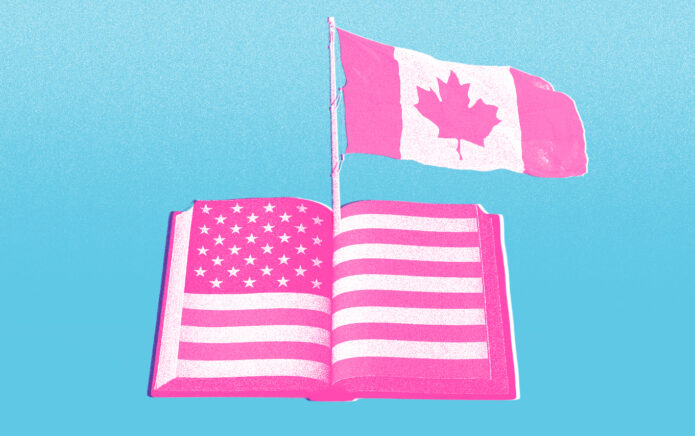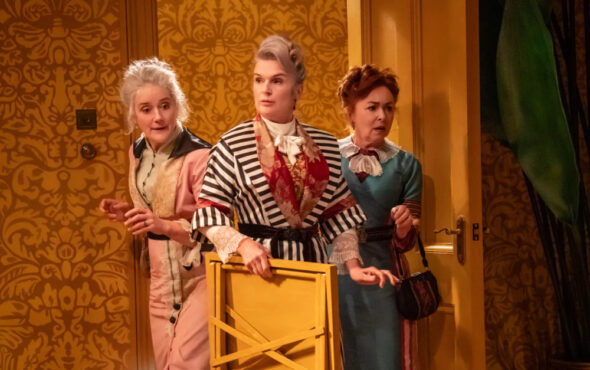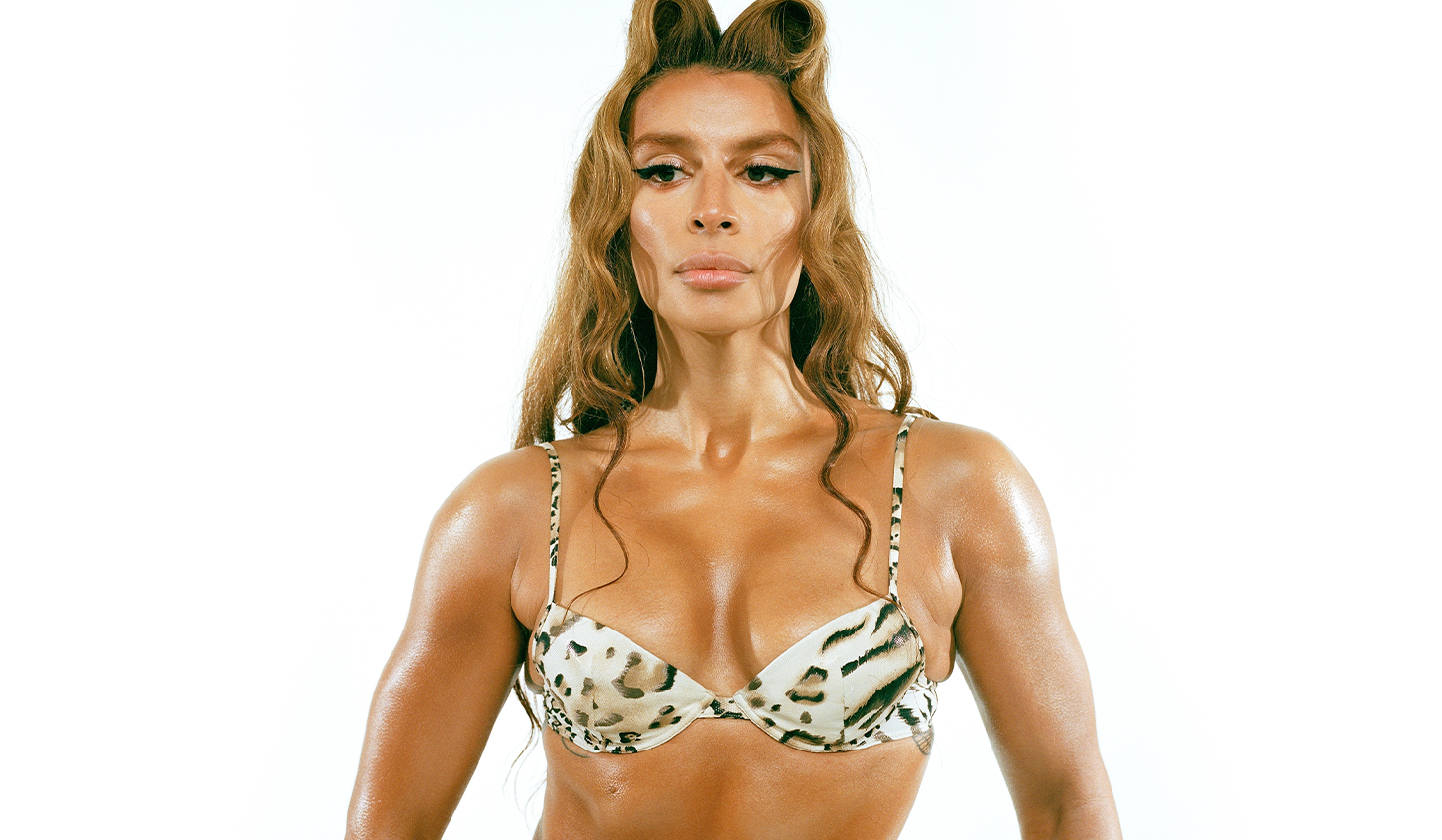
With their exploration and celebration of the “universal divine feminine energy” on ‘Alibi’, Sevdaliza and Pabllo Vittar have made herstory. This summer, their bullerengue, baile-funk banger – featuring additional vocals from French singer Yseult – became the number-one TikTok song globally and graced the Billboard Hot 100 with its presence, where Sevdaliza and Pabllo respectively became the first Dutch-Iranian and second drag queen (after RuPaul) to land a hit on the U.S. charts.
That’s not all: after just two months, ‘Alibi’ is approaching 400 million worldwide streams and the Queen of Brazilian Pop, former GAY TIMES cover star Anitta, has just hopped on a remix for ‘Pt. 2’. ‘Cultural reset’ and an abundance of exclamation marks (!!!) feel appropriate here. “The song is resonating because it’s fresh and all three artists are really powerful in their own way,” says Sevdaliza, who also credits the quadrilingual smasher with subverting expectations for drag artists in the music industry. “I’m honoured to play a part in that. I’m also queer, and I feel so much closer to drag queens and trans women.”
In conversation with Pabllo Vittar, Sevdaliza reflects on the creation of their hypnotic and – again, it bears repeating – herstoric new single, how receiving transphobic hate as a cis woman brought her closer to the trans community and her mission to represent “true Persian women” in her music. Pop music emergency alert: there’s also talk of new material…
Pabllo: Can you tell me a bit about the writing and collaboration process for ‘Alibi’? What was it like collaborating with myself and Yseult?
Sevdaliza: The song was being made as the features were being added, and I started with just the sample without my vocals on it. I went to the studio in LA, I was also producing it, and Yseult came there. She started to record a bunch of stuff and I was like, ‘Wow, this sounds cool.’ I thought that it could be more of an anthem so I pushed it in another direction. Then, you came on it and it sounded like drag opera! The whole vision started to come together – it’s definitely not a normal song. I also crafted the production around every vocalist’s individual verse, because it was a lot of puzzling [together]. That’s why it took so long to make.
Pabllo: It was an honour to be part of this very strong, very empowering song. I’m blessed. I wanted to show people a different side of me and vocals that I’ve never done before in a song. When you sent it to me and I started to work on it, the song instantly made me go for those kind of vocals, and they fit perfectly with yours and Yseult’s. This song made history as only the second entry for a drag queen on the Billboard Hot 100 after RuPaul, and I feel very blessed. In Brazil, in my childhood, I didn’t have an artist to look at and feel like I could be there too, you know? I feel blessed that RuPaul inspired me at the beginning of my career and, now, I can be that inspiration to people growing up. Maybe they can see a little bit of themselves in me and in powerful people like you and Yseult…
Sevdaliza: ‘Alibi’ is also history for me, because I’m the first Dutch-Persian woman in the Billboard charts, ever. From the beginning – I want to say of my ‘career’, but it’s actually my life – I’ve experienced bullying because of how I look. People always said that I was a man or that I’m transgender, and I’ve heard these comments since I was maybe six-years-old. People started to compare their hands and feet to mine. When I started to perform, there were a lot of fans who came to my shows in drag. I loved it because they did me in drag, it was such an honour that someone thought I had the kind of beauty to [emulate] in drag. So I always have a really positive experience with drag. Drag is being ridiculed in the mainstream and seen as a joke, more than a serious art-form. ‘Alibi’ is a huge step in changing how drag queens are being perceived in music. It’s part of your artistry as Pabllo Vittar, and I’m honoured to play a part in that. I’m also queer, and I feel so much closer to drag queens and trans women because I’ve been treated like that. For me, it’s really nice to embrace this instead of chasing what is perceived right now in the mainstream as “cool”. I wanted to create my own “cool”.
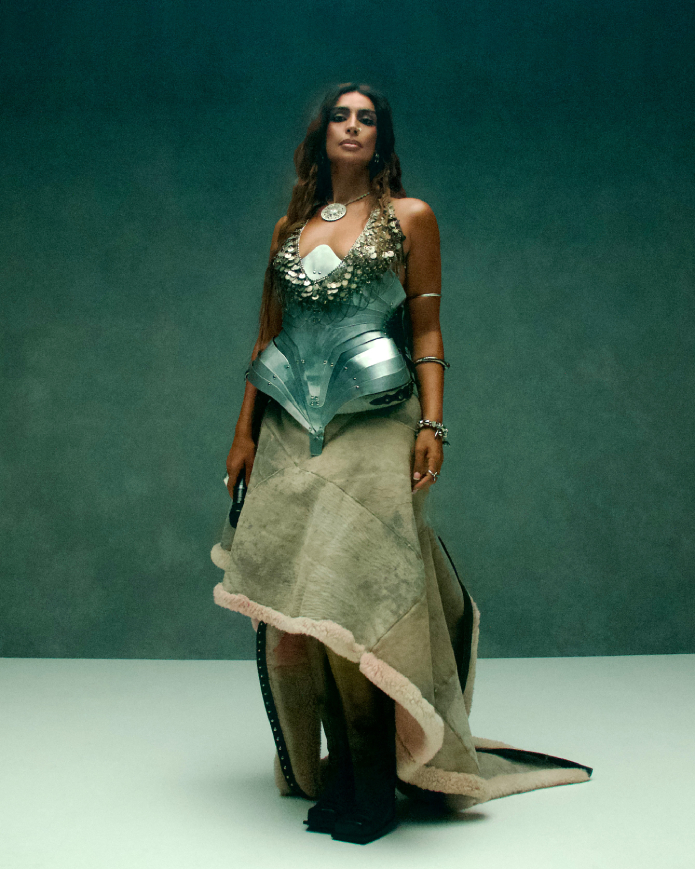
Photo: Jozef Wright
Pabllo: I hear you. What you are describing about the bullying, this reminds me of the online abuse that Imane Khelif received during the Olympics this summer.
Sevdaliza: I have a really outspoken opinion on [the Olympics controversy] and I have no problem talking about it. It’s misogyny. Whenever a male athlete has physical advantages, like Michael Phelps with his wings, nobody talks about that being unfair towards the other male swimmers. But when there’s a woman with a physical advantage that has no place in the, I would say, white, ethnocentric stereotype… I was a professional basketball player and everybody would call me a man or say I’m “too muscular”. I remember watching Serena Williams destroy her opponents, and everybody was calling her a man. There is a certain type of place for cis women in society. If they’re not in that place, if they’re too strong, too powerful or [conforming to] this white standard of how to be powerful, they immediately call her a man. Since I realised this, I have no shame to be myself, to be loud, to show my feet or my body. In the end, my face has never been seen as a beauty standard. Everyone in my family has the jawline and the nose. If you look at my grandma, she looks like a warrior. She’s huge, a big build, and I don’t think that she’s less of a woman because she looks like that. What they’re doing to this boxer is disgusting because they don’t have the facts. In general, everybody that identifies as a woman is being treated disgustingly. They always find a way to make it hard for us.
Pabllo: Yeah, it’s really important to bring that up right now, especially in the [context of the] Olympics. We still keep talking about this kind of transphobia and misogyny, like you just said, about how a woman’s body should be. It’s crazy. That shouldn’t be the subject that’s discussed, and people are still discussing it. So, yes, we have to bring it up and be out-and-loud about it because it’s gotta stop somehow.
Sevdaliza: There’s this historical piece about how women’s beauty standards have never been separate from a woman’s suffering. Whether it’s the corset, the BBL or anorexia, every beauty standard for a woman involves suffering. You have to be able to try to set yourself free from it. For us, performers, it’s way more difficult to be free from it because we are constantly in the limelight. Everybody’s judging you, and everybody has an opinion about you. But this does help me sometimes to be like, ‘Okay, maybe I don’t need to suffer as a woman. Maybe it’s okay, you know?’
Pabllo: ‘Alibi’ has become huge and Sevdaliza, you deserve it. I’ve been a huge fan since ‘Haunted’…
Sevdaliza: Yeah, 2015!
Pabllo: And I started in 2015, so I’ve been with you a long time and I’m always a fan. I think [the success of the song is because of] the languages. If you ask a producer or anybody who’s worked in music, one song with three languages is kind of wild! Sevdaliza, we have no regrets. When I listened to the song for the first time, I sent you the photo in the studio because I was feeling the fantasy. When I saw the song was growing, growing, growing on TikTok, it was magic.
Sevdaliza: For me to have a song with this meaning and these collaborators to blow up, it’s a dream. I definitely think the song is resonating because it’s fresh and all three artists are really powerful in their own way. Us three, it’s like… poof! So, times three on a song? It’s resonating for many reasons. It’s the hook sample, the languages, the artists, the message. I’m really grateful that it’s not some ‘la-la-la’ [song], it has true meaning. I first started this narrative with ‘Human’ ten years ago, the narrative of inclusiveness. ‘Human’ was my first commentary on all those [misogynistic and transphobic] comments I was getting and it even became this drag anthem for a while. I didn’t really understand that for a while until I saw [the impact] and was like, ‘Ah, that makes so much sense.’ It’s just, ‘I’m human’. ‘Alibi’ is the extension of this narrative with two different artists that are having their own struggle with what they are and who they are.
Pabllo: You often discuss womanhood, identity and motherhood in your music. Why is it important for you to spotlight these topics?
Sevdaliza: There is this oversaturation of the sexual identity of the woman in our art. But, there’s an under-representation of all the other stuff that women go through. I just feel like it’s refreshing to show different sides of our being instead of just being sexy. We are sexy all the time, but we also have a lot of struggles. I like to show that I’m very powerful. You know how I perform, right? It’s almost like a beast. But then I also like to show that I don’t like my stomach and my kid is making me very tired. I like to show this contradiction because I think the character should be rich and the representation, like a male artist can be. It should be rich. To give another example, I find it really refreshing to hear iconic artists like Madonna or Lady Gaga give an interview because then you realise why they are iconic. They’re so layered and powerful. They are mothers, they are beasts, they are vulnerable and they suffer. When you’re able to embrace this stuff, then you can be an icon instead of just a submissive portrayal of what the patriarchy wants you to be. If you want to be all fucking sex and own it, great. Then you’re stepping more into an Anitta identity, which I think Anita is really embracing. She’s like, ‘Yes I’m sex, but I’m not sex because you want me to be.’ I like it when [women] are doing it because they want to do it.
Pabllo: With your Iranian heritage, have you felt pushback for being a powerful LGBTQIA+ woman?
Sevdaliza: Yes. I cannot go back to Iran ever because I would get killed or imprisoned because of my art. It’s very common because Iran is run by the Islamic regime. In Iran, we are not allowed to make music without any other purpose than religious purpose. We are not allowed to dance. We are not allowed to sing. We are not allowed to show our hair. This is since the Islamic revolution, since [Rujollah] Khomeini took over power. I was born in Iran and fled with my parents to the Netherlands when I was five. Recently in Iran, there has been uproar because of the Morality Police, which means that we have special police who can arrest women whenever they want because of how they look. They just take them to prison and you don’t know when you get out. I never want to be a part of this, you know? It’s crazy that religion can oppress women. I never want to be a part of that. So, I feel very confident in who I am. I just want to represent what, for me, being a true Persian woman is instead of what has been shown about us. But there’s so many powerful Persian women right now in the industry like Golshifteh Farahanii, who’s a famous actress and activist. We also have a singer, Googoosh. She lives in LA and she’s always been a very outspoken activist against this regime. To conclude it, I feel really connected with Brazilians and Latin American people because of the warmth of the culture. I realised two weeks ago that I really miss my people because I don’t really have Iranians in my life. Since I went to Latin America I was like, ‘Bitch, I wanna be here because people are warm.’ I do really miss that. It might even be one of the reasons that my music became more warm because I’m looking for this home, or this feeling of home. And I never found it in my country. It’s a bit sad.
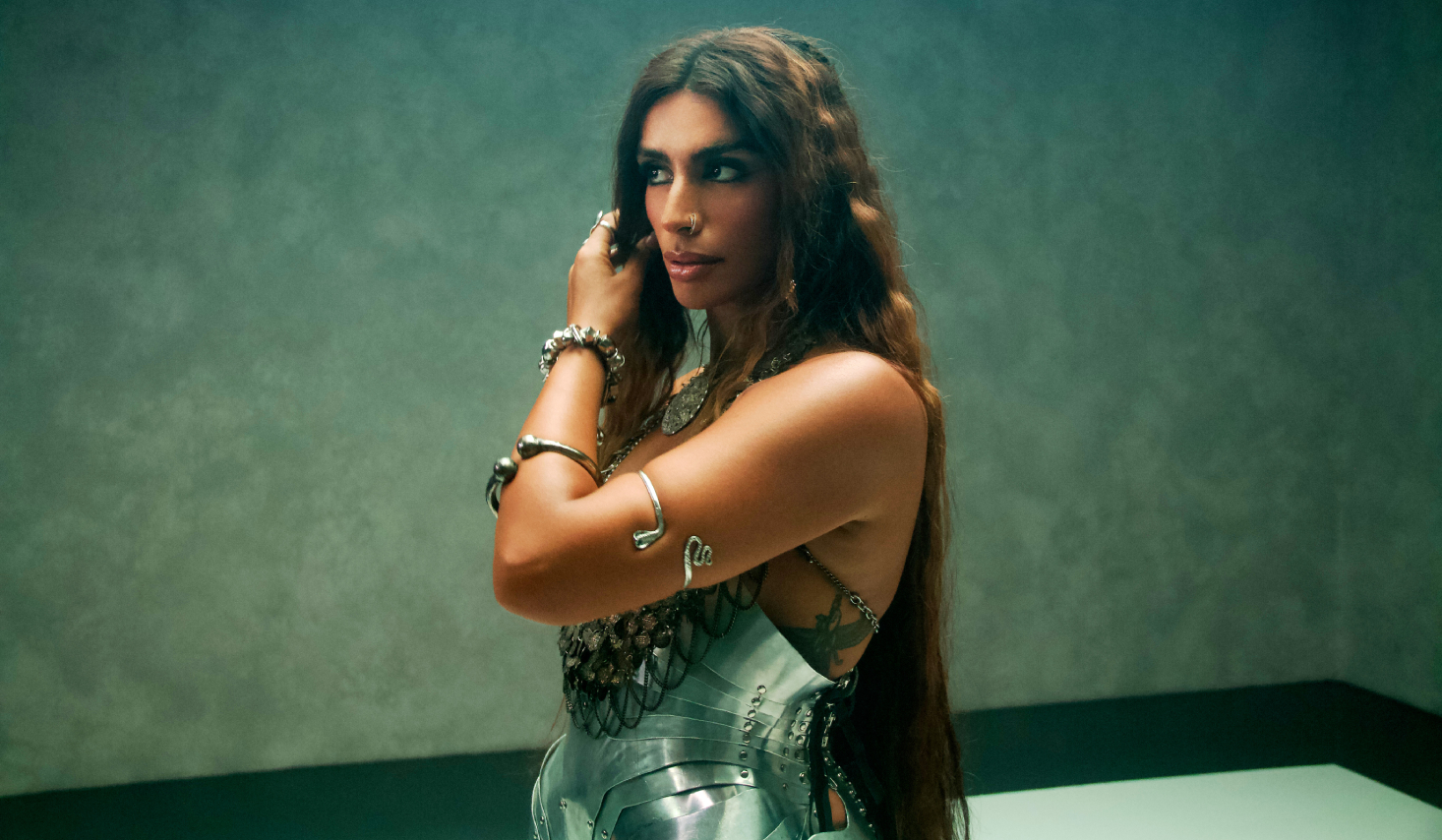
Pabllo: Sevdaliza, what can you tell us about your new album?
Sevdaliza: I cannot say anything! But, it’s going to be crazy. I’ve been working on this era for more than three years. I’m a Virgo and that means if I don’t have 40 demos ready, I’m nervous! I’m a workaholic and I like to have six singles ready to go. So, I have a lot of material but I need to ‘Alibi’ it. I don’t know how I’m going to behave with this release cycle thing because I like to release on my own terms. Sometimes it takes a lot of time, but I’m really excited about my new material and I’m really excited about your material. Did you want to talk about your new music?
Pabllo: Yeah, I got a few new releases coming! I’m so happy I have this collaboration that went huge, I’m in love. I already have another song called ‘São Amores’ that went viral in Latin America, and I just released two new songs ‘Hoje á Noite‘ and ‘Planeta de Cores’. I’m working on my next studio album for next year, which will be in English and Spanish. I’m also getting ready for another global tour in North America, Latin America, Europe and Australia. So, lots of new music, a tour and more soon!
‘Alibi Pt. 2’ (with Anitta, Pabllo Vittar and Yseult) is out now.
